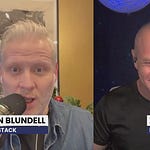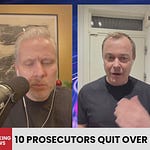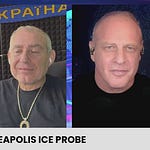Help fund Lev Parnas’ effort to build a pro-democracy movement by becoming a paid supporter here
And for a limited time get 25% off Narativ’s annual plan by clicking the button below.
5️⃣ Little Odessa
In a special FiveStack episode, Lev Parnas took viewers on a remarkable journey through Brighton Beach, the Brooklyn neighborhood where he grew up after immigrating from Ukraine. Walking the streets where Russian and Ukrainian immigrants settled in the 1970s and 80s, Parnas offered rare first-hand insights into the community that became a significant nexus in the Trump-Russia story.
"This is primarily where we all immigrated in the 1970s and 80s as prosecuted Jews from the Soviet Union," Parnas explained, pointing out the apartment buildings, shops, and restaurants that formed this vibrant enclave. In a surprising revelation, Parnas shared that he worked for Fred Trump as a teenager, selling co-ops in the Trump buildings that still stand in the neighborhood today.
The tour vividly illustrated how this melting pot of Russian, Ukrainian, and other former Soviet immigrants created a cultural bridge that would later become central to Trump's business and political relationships. "The beauty of Brighton Beach is it was just a mixture of everything. You have Jews, Catholic, Christians, Russians, Uzbek, Kazakh, but we all related as ones," Parnas reflected as he navigated the familiar streets.
4️⃣ Origin Story
As Parnas guided viewers through a Russian supermarket filled with traditional foods, he reflected on his extraordinary personal journey from Trump confidant to democracy advocate. When asked about whether he had regrets about turning against Trump, especially after his 2024 victory, Parnas was unequivocal.
"I got a lot of calls from people inside Trump that were like, 'Oh, you see, you should have just waited a little longer. Oh, why don't you, you know, you could get back into his good graces,'" Parnas revealed. "I thought about that. I said, it was never about that. It was about right or wrong."
This remarkable transformation reflects Parnas's evolving understanding of Trump's true intentions. "Even when I was with Trump, as crazy as it sounds, I thought I was doing the right thing. I thought I was helping save our democracy," he explained. "And when I realized it wasn't the case, I tried to do the right thing again, this time being on the right side of history."
3️⃣ Mob Story
Walking along the famous boardwalk, Parnas warned about the invisible power structures supporting Trump's administration. "The crazy part is the ones that you don't see," he cautioned. "The people that are spending the $5 million for these gold cards that Latina keeps talking about. I want to see who these people are."
This insight into Trump's secretive financial backers followed discussion of recent trips to the Middle East, where the Trump family has been securing business deals while conducting official diplomacy. "You didn't see all the other people that are working with Trump on Air Force One or have went there alongside of cutting business deals while Trump is there," Parnas explained, describing how Trump administration policy benefits wealthy supporters away from public view.
Parnas emphasized the worsening authoritarian trajectory ahead: "It's going to get worse before it gets better because this guy is out for not only vengeance and revenge, but he's figured out that he has certain power that's not being controlled or being held accountable for."
2️⃣ Kabuki Theater
The conversation turned to breaking news of the day - a two-hour call between Trump and Putin following Russia's largest drone attack of the war, with 273 drones sent into Ukraine just one day before their scheduled conversation. Parnas offered unique perspective on this relationship and the supposed peace negotiations.
"I've always said, you know, they can't have a ceasefire because Putin can't stop the war," Parnas explained. "He needs to, he wants to take over Ukraine. He wants to unite the Soviet Union, he wants to go into Europe. That's what Putin wants." Parnas detailed how Putin's war machine has transformed Russia's economy and social structure in ways that make genuine peace impossible.
Reflecting on the statements from both leaders following their call, Parnas noted: "Just think about the statements that he's made in the past, like 72 hours about the difference from 'we need the peace talks,' 'I'm going to stop it,' 'only I can stop it'... and today they spoke about for two hours and they didn't even discuss even talk about these plans. I mean, I'm laughing but it's sad."
1️⃣ Brighton Beach Boardwalk of Crime
As Parnas walked viewers through the cultural landmarks of Brighton Beach, he offered fascinating insights into the neighborhood's complex history of organized crime, including where Russian and Italian crime families interacted and eventually collaborated.
Pointing toward the location of the El Carib catering hall once owned by Michael Cohen's family member, Parnas described how it became "home to the five Italian families and also Murad Balagula, who was the godfather of the Russians." This convergence of criminal enterprises changed the nature of organized crime in America, as Russians introduced sophisticated financial schemes that transformed traditional mob operations.
"The Russians came with crazy business ideas of how to do Medicaid fraud, tax fraud, all these different huge billion-dollar fraud schemes," Parnas explained. "A lot of the Russians were not gangsters, but they were mathematicians." This cooperation ultimately changed New York City itself, as Russian immigrants brought not just criminal innovation but also cultural and economic transformations to America's largest city.
The FiveStack is available as an audio podcast on Apple Podcasts and Spotify. Advertising inquiries email next@narativ.org. The FiveStack is a co-production of deanblundell.substack.com and narativ.org.
















